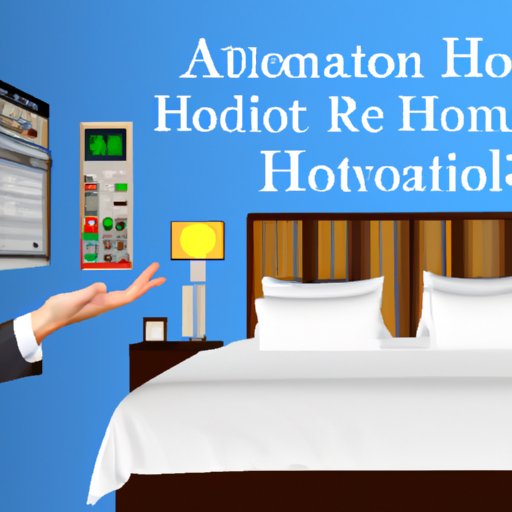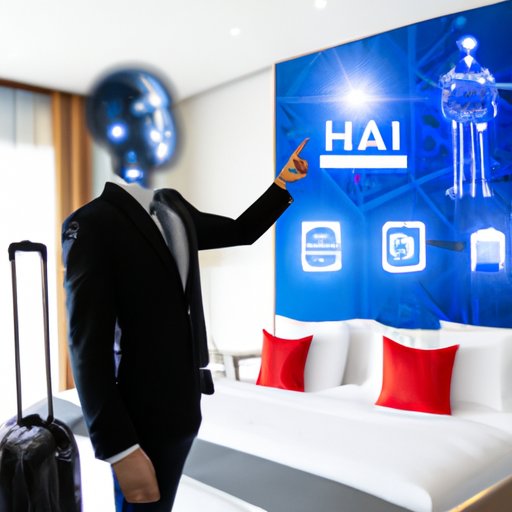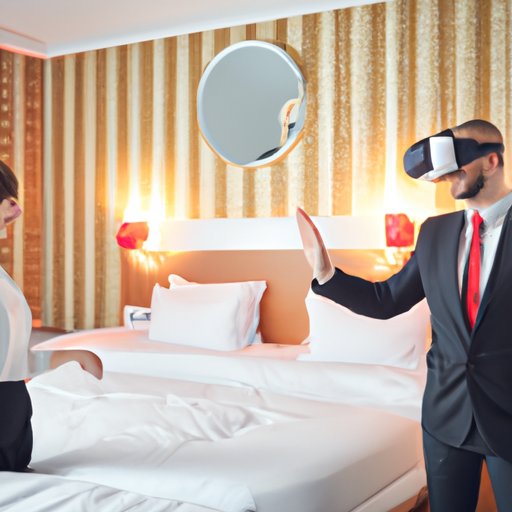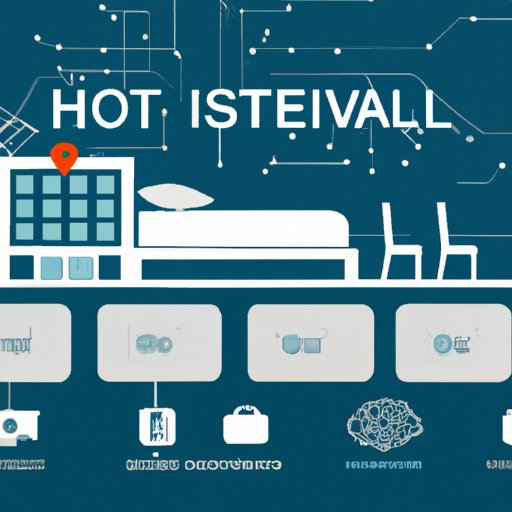Introduction
Technology is transforming the hospitality industry, from the way hotels operate to how they engage with customers. Hotels are leveraging various technologies – such as automation, artificial intelligence (AI), mobile applications, big data, and virtual reality – to improve efficiency, enhance guest experiences, and drive revenue. In this article, we will explore how technology is changing the hotel industry.

Exploring the Benefits of Automation for Hotels
Automation is a key technology that is revolutionizing the hospitality industry. Automation helps hotels become more efficient by streamlining operations and reducing human error. Automation also enables hotels to provide superior service quality, resulting in improved customer satisfaction.
Increased Efficiency in Hotel Operations
Automation is making hotel operations more efficient. Automated systems can help hotels manage tasks such as booking reservations, managing inventory, and tracking customer preferences. Automation also helps reduce manual labor costs, as hotels no longer need to hire staff to perform these tasks.
Improved Quality of Service
Automation helps hotels provide better customer service. Automated systems can help hotels quickly respond to customer inquiries, process requests, and track customer feedback. This ensures that customer needs are met in a timely manner, resulting in higher customer satisfaction.
Reduced Human Error
Automation reduces the risk of human error. Automated systems can ensure that tasks are completed accurately, quickly, and consistently. This eliminates the need for manual checks and double-checking, which can be time-consuming and prone to mistakes.

Examining the Impact of AI on Hotel Services
AI is another technology that is transforming the hotel industry. AI-powered systems can help hotels automate tasks such as check-in and customer service. AI can also be used to predict maintenance needs, ensuring that hotel facilities are kept in top condition.
Automated Check-in Systems
AI-powered automated check-in systems enable hotels to provide a seamless check-in experience for guests. These systems can quickly verify guest identification and provide access codes, eliminating the need for manual check-ins. This saves time and improves customer satisfaction.
Chatbots for Customer Service
AI-powered chatbots can provide customers with personalized assistance. Chatbots can answer common questions quickly and accurately, freeing up staff to focus on more complex tasks. This helps hotels provide better customer service and build stronger relationships with their customers.
Predictive Maintenance
AI can help hotels predict when maintenance needs to be done. AI-powered systems can monitor equipment and alert staff when it is time to replace parts or perform repairs. This helps hotels maintain their facilities in top condition and avoid costly breakdowns.
Analyzing How Mobile Apps are Transforming the Hotel Industry
Mobile apps are becoming increasingly popular in the hotel industry. Mobile apps enable hotels to provide guests with a convenient and personalized experience. They can also help hotels generate additional revenue and streamline communication.
Improving Guest Experiences
Mobile apps can help hotels improve their guests’ experience. Apps can be used to provide guests with information about the hotel, local attractions, and nearby restaurants. Apps can also be used to allow guests to make bookings, request amenities, and check out quickly and easily.
Enhancing Revenue Generation
Mobile apps can help hotels generate additional revenue. Hotels can use apps to offer discounts and promotions. They can also use apps to sell merchandise, such as hotel-branded items, and to promote add-on services, such as spa treatments.
Streamlining Communication
Mobile apps can help hotels streamline their communication with guests. Apps can be used to send notifications about upcoming events or special offers. They can also be used to send messages to guests, such as reminders about check-out times or messages about housekeeping services.
Investigating the Role of Big Data in Enhancing Hotel Experiences
Big data is another technology that is revolutionizing the hotel industry. Big data enables hotels to collect and analyze customer data to gain valuable insights. This helps hotels create targeted marketing strategies and personalize guest experiences.
Collecting and Analyzing Customer Data
Big data enables hotels to collect and analyze customer data. Hotels can use big data to track customer preferences and behaviors. This helps hotels understand their customers better and identify areas where they can improve their services.
Targeted Marketing Strategies
Big data can also help hotels create targeted marketing strategies. Hotels can use customer data to develop personalized campaigns that are tailored to individual customers. This helps hotels increase engagement and boost sales.
Personalizing Guest Experiences
Big data can help hotels personalize their guest experiences. Hotels can use customer data to customize their offerings based on customers’ preferences. This helps hotels create memorable experiences for their guests and build strong relationships with them.

Assessing the Use of Virtual Reality for Hotel Guests
Virtual reality (VR) is another technology that is being used in the hotel industry. VR can be used to introduce immersive experiences for guests. It can also be used to enhance brand loyalty and leverage new technologies.
Introducing Immersive Experiences
VR can be used to introduce immersive experiences for guests. Hotels can use VR to create virtual tours of their properties, allowing guests to explore the hotel before they arrive. This can help hotels stand out from their competitors and attract more customers.
Enhancing Brand Loyalty
VR can also be used to enhance brand loyalty. Hotels can use VR to create unique experiences for their guests, such as virtual cooking classes or interactive art installations. This helps hotels create an emotional connection with their guests, which can lead to increased loyalty.
Leveraging New Technologies
VR can be used to leverage new technologies. Hotels can use VR to create augmented reality experiences for their guests, such as virtual scavenger hunts or interactive games. This helps hotels stay ahead of the competition and provide innovative experiences for their guests.
Conclusion
Technology is transforming the hotel industry. Hotels are leveraging various technologies – such as automation, AI, mobile apps, big data, and virtual reality – to improve efficiency, enhance guest experiences, and drive revenue. Automation helps hotels become more efficient, while AI enables them to provide superior service quality. Mobile apps help hotels provide convenient and personalized experiences for guests, while big data helps them create targeted marketing strategies. Finally, virtual reality can be used to introduce immersive experiences and leverage new technologies. By leveraging these technologies, hotels can stay ahead of the competition and deliver exceptional experiences for their guests.
(Note: Is this article not meeting your expectations? Do you have knowledge or insights to share? Unlock new opportunities and expand your reach by joining our authors team. Click Registration to join us and share your expertise with our readers.)
